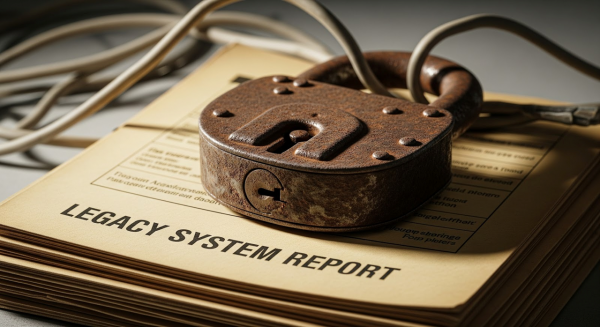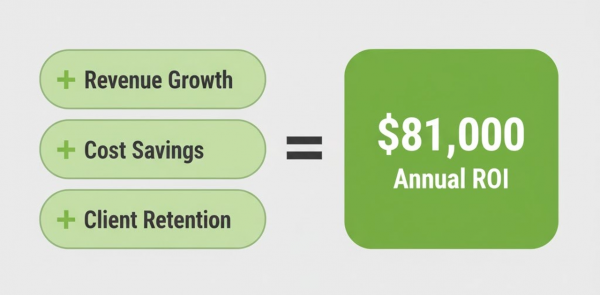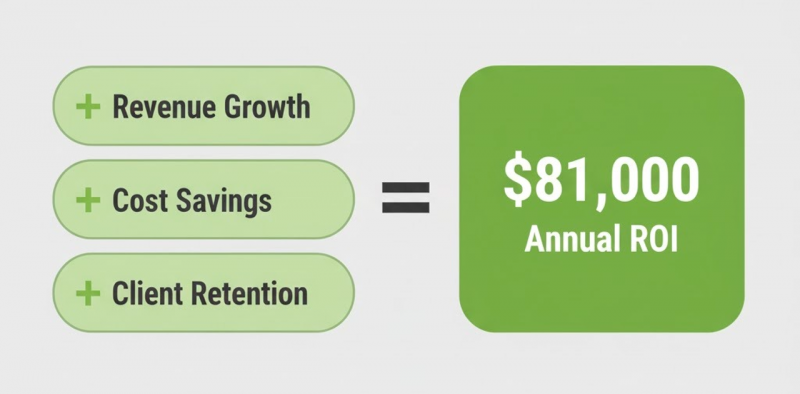Is Your Assessment Toolkit Holding You Back? The +$81,000 ROI of a Modern White-Label Platform

In today’s competitive landscape, clients expect more than advice; they demand data-backed, tech-enabled solutions that deliver tangible, measurable results. For HR consultants, RPOs, and talent management experts, psychometric assessments have evolved from a simple value-add to a cornerstone of strategic service delivery.
But as client expectations have risen, a critical question has emerged: Is your current assessment toolkit a competitive advantage that sets you apart, or is it a liability that is holding you back?
For many practitioners, the tools they rely on have become undifferentiated. They are inflexible, built on legacy technology, and force a one-size-fits-all approach onto unique and nuanced client challenges. These platforms lack the deep customization, predictive power, and operational efficiency needed to stand out.
If you’re using an established competitor, you may be paying premium prices for a platform that limits your ability to innovate and deliver the actual value your clients demand. The decision to upgrade is no longer just a technical consideration; it's a strategic imperative.
The cost of staying with an outdated provider is often far greater than switching. The good news? The ROI on upgrading is faster and more significant than you might think.
The "Switching Barrier" Fallacy: The Hidden Costs of Staying Put

Many consultants feel "locked in" with their current assessment provider, believing the process of moving to a new platform is too disruptive. This perspective, while understandable, is a fallacy that leads to significant and compounding opportunity costs. The perceived difficulty of switching is often insignificant compared to the tangible, daily costs of staying with an inferior product.
These costs manifest in several ways:
- Lost Opportunities: This is the most direct cost. You're forced to decline a project or submit a weak proposal because your current tool can't create the specific, multi-faceted assessment the client requires. You can't build the perfect blend of cognitive, behavioral, and situational traits for their unique role. Every "no" or "we can't do that" is a direct loss of revenue and a potential win for a more agile competitor.
- Client Dissatisfaction: You find yourself delivering generic, boilerplate reports that don't provide the deep, role-specific insights that sophisticated clients expect. This leads clients to question the value of the assessments and, by extension, the value of your services. The tool that was meant to be a value-add is now causing friction.
- Brand Erosion: Relying on outdated technology with a clunky interface makes your entire practice appear out of touch. In a market that values innovation, being seen as a provider of standardized tools—rather than a strategic, tech-forward partner—is a significant disadvantage for your brand and your ability to command premium fees.
In practice, the cumulative opportunity cost of being inflexible often exceeds the cost of upgrading to a modern platform.
The Strategic Advantage: More Than a Tool, A Business Multiplier

A modern white-label assessment platform is more than just software; it's a vehicle for driving business transformation. It allows you to enhance your current offerings, create powerful additional revenue streams, and solidify your position as an indispensable market leader.
This isn't a "rip and replace" scenario. A modern platform offers the flexibility to "expand and enhance" your toolkit. You can continue to provide legacy assessments for specific use cases while introducing a more powerful, flexible, and feature-rich option for clients who need a truly bespoke solution.
This approach de-risks the transition and allows you to:
- Upsell existing clients with a premium, custom-built offering that solves their most complex challenges.
- Win more business from competitors who are stuck with rigid, one-size-fits-all tools and simply can't match your new capabilities.
- Create additional revenue streams by bundling assessments with your existing offerings. For partners like background-checking companies or ATS providers, behavioral and cognitive assessments are the missing piece. Bundling them creates an integrated solution that significantly increases revenue per client and builds a powerful competitive moat.
Modeling the ROI: A Tangible Business Case
The actual value of a modern platform lies not just in cost savings but in its ability to give you a clear competitive edge. A realistic business case, based on partner feedback, is the most straightforward way to demonstrate this tangible impact.
Let's model a hypothetical firm, "Acme Consulting," to see the financial impact of switching from a legacy provider to a modern, flexible platform. By switching, Acme Consulting gains a potent competitive edge (AI-powered recommendations, mix-and-match flexibility). They can now create truly bespoke solutions, and their proposals stand out.
Their close rate improves, resulting in a 30% increase in project wins. This single improvement is just one part of the equation. When combined with direct cost savings from platform fees and time saved on manual admin, plus the value of retaining at-risk clients, the financial impact becomes undeniable.
Our model, based on a firm winning 10 projects per year, shows that switching from a legacy platform to a modern one can yield a Total Annual ROI of $81,000.

This is the tangible ROI of a true competitive advantage. But where does that number come from? It's a combination of new revenue growth, hard cost savings, and client retention—all of which are at risk with an outdated toolkit.
4 Features to Demand From Your Assessment Platform

The decision to upgrade is driven by a need to deliver superior client results and build a more scalable business. Here’s what top-performing consultants demand from their assessment partners—and why these features are non-negotiable.
1. From Rigidity to Flexibility: The Power to Mix-and-Match
Legacy systems offer a fixed, static menu of off-the-shelf tests. A modern platform provides a comprehensive library of independently validated scales that you can mix and match to create customized assessments tailored to any role, industry, or client need. Instead of trying to fit a square peg into a round hole, you can build the perfect assessment for a unique sales role that requires a specific blend of grit, optimism, and emotional intelligence. You move from being a simple test administrator to a genuine strategic solutions provider.
2. From Manual to AI-Powered: Instant, Data-Driven Recommendations
The old way involves spending hours manually reviewing job descriptions, building competency models, and trying to map them to a library of generic tests. The modern way is to leverage an AI-powered engine that instantly analyzes a job description, identifies the critical competencies for success, and recommends the optimal scale combination for a predictive, role-specific assessment. This not only saves you hours of administrative work but also eliminates subjectivity, ensuring you are always using the most effective tool for the job.
3. From VULNERABLE to Secure: Built-in Integrity for Remote Testing
In a remote-first world where unsupervised testing is the norm, cheating is a significant threat to assessment validity. A modern platform must include robust anti-cheating features, such as webcam monitoring, cut-and-paste prevention, and advanced algorithms that flag suspicious activity. For your clients, this is about guaranteeing the quality of their hires and protecting their brand from the risks of fraudulent results.
4. From Vendor to True Partner: A Commitment to Your Success
A vendor sells you software and a login. A true partner invests in your growth. Look for a provider who delivers a comprehensive marketing and sales kit designed to help you succeed. This should include co-branded marketing slices, detailed product documentation, compelling case studies, and hands-on sales training. A true partner understands that their success is tied directly to your ability to win more business.
Frequently Asked Questions (FAQ)
What is a white-label assessment platform?
A white-label assessment platform is a service that enables a company (such as an HR consultancy or RPO) to offer modern psychometric assessments to its clients under its own brand. The platform is built and maintained by a third-party, but the consultant sells it as their own integrated solution.
What is the ROI of switching to a modern assessment platform?
The ROI comes from three areas: 1) Increased Revenue, by winning more competitive deals with a flexible, modern offering. 2) Cost Savings, by reducing or eliminating fixed license fees and saving thousands of hours of manual administrative work. 3) Client Retention, by mitigating the risk of clients leaving due to outdated technology. Our sample model shows a potential annual ROI of over $81,000.
What are the key features of a modern assessment platform?
Key features include: 1) Mix-and-match flexibility to create custom, role-specific tests. 2) An AI-powered engine to analyze job descriptions and recommend the right scales. 3) Robust, built-in anti-cheating features like webcam monitoring. 4) A 'true partnership' model that includes marketing and sales support kits.
Conclusion: Your Toolkit Should Not Limit Your Future
Whether you are adding assessments to your services for the first time or have decided your current provider is limiting your growth potential, the conclusion is the same: a modern, flexible, white-label platform is a sound strategic choice. It directly addresses the challenge of market differentiation by reducing costs, unlocking powerful additional revenue streams, and positioning your firm as an innovative leader in the talent management space.
An outdated toolkit should not limit your business's future. The market has evolved, and the tools you use should evolve with it.
Build Your Business Case
This article outlines the strategic advantages of upgrading your assessment platform. The next step is to build your internal business case.


